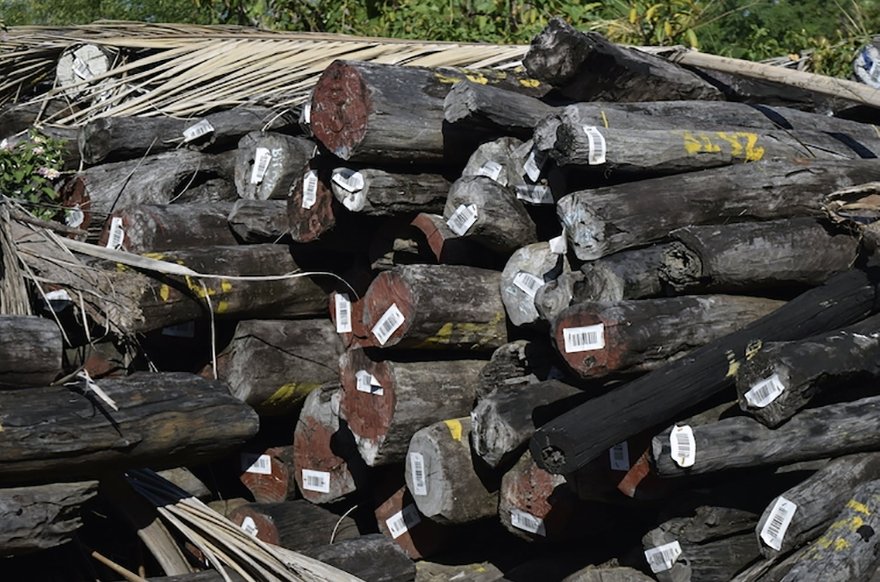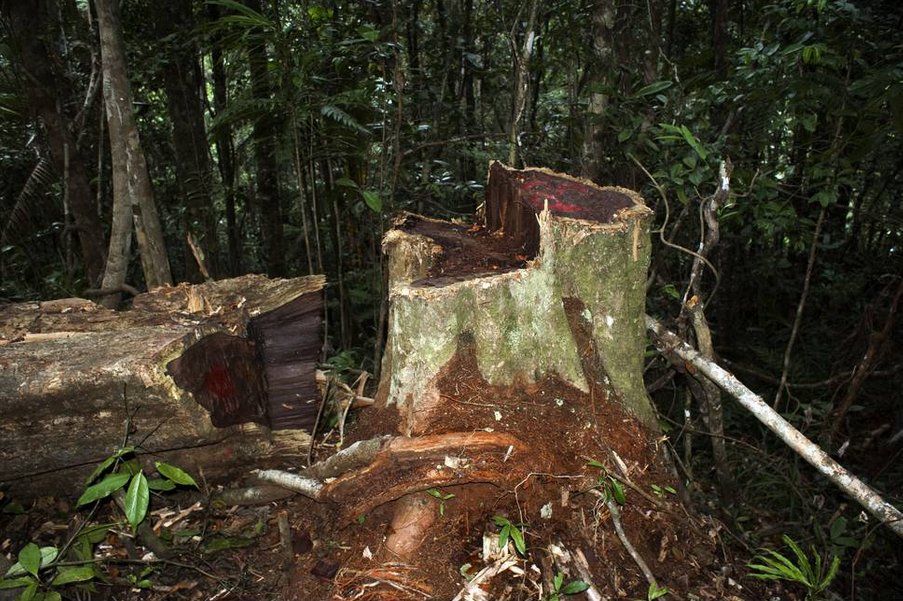THE CONSCIENTIOUS ENVIRONMENTALIST
we talk freely, informed, sciency, but always opinionated
Madagascar's precious trees at risk: CITES action needed to regulate rosewood and ebony trade
by Mark W. Roberts, Derek Schuurman, Lucienne Wilmé, Patrick Waeber, 6 November 2023
The Convention on International Trade in Endangered Species of Wild Fauna and Flora (CITES) is designed to “ensure that international trade in specimens of wild animals and plants does not threaten the survival of the species.”
Is CITES fit for purpose?
CITES is the only treaty devoted to conservation of species by attempting to regulate international trade in rare and endangered species with binding authority and enforcement provisions. [I don’t know enough about the CBD to succinctly state why it isn’t effective in stopping species loss, so changed this] Regrettably, the CITES framework provides for continued trade in species listed on Appendix II and III in the absence of scientific data that proves that specific trade will be detrimental to the survival of the species. Lack of data to undertake meaningful non-detriment findings and legal acquisition findings, weak laws implementing and enforcing CITES decisions, weak forest governance, corruption and powerful criminal syndicates all facilitate the continuation of unsustainable trade. Pressure is building for CITES to place a greater emphasis on rare and endangered species conservation, and to shift the burden for continued trade to the countries and entities pushing for the continuation of trade rather than on the people and countries seeking to protect the species threatened by trade.
At its highest decision-making meeting, CITES 19th Conference of the Parties (CoP 19), CITES in November 2022 gave a nod to allowing Madagascar to establish a domestic trade in rosewood and ebony from the “official” stockpiles without ensuring that Madagascar has the infrastructure in place to create, administer and enforce such a trade without creating unsustainable international trade. The proposal was not discussed at all at CoP 19 based upon the decision that a domestic trade even in these highly prized tree species falls outside CITES’ jurisdiction.
By inviting Madagascar to propose a “domestic” trade in rosewood and ebony, CITES may have opened the door to activities which could bring about the final demise of Madagascar’s iconic forests. Given that these commodities are prized by Chinese furniture-makers and by international musical instrument makers, the notion of solely a domestic trade is a falsity. Madagascar's proposal to permit the sale of unspecified 'handicrafts' weighing up to 10 kg, presumably to international tourists, heightens the risk of transforming domestic trade into illegal and unsustainable international trade. Unless this domestic trade is strictly regulated and administered, the goods sold domestically can enter international trade and undermine CITES’ efforts to protect Malagasy rosewood and ebony species.
Ravaged rosewood and ebony: Epic failure of Madagascar's forest governance
Weak forest governance, political instability, and civil unrest coupled with corrupt government practices in Madagascar during the 2000s and 2010s led to hundreds of thousands of rosewood and ebony logs being stockpiled around the country. In 2013, all species of Madagascar’s rosewood (Dalbergia spp.) and ebony (Diospyros spp.) were placed on CITES Appendix II and an embargo was put in place on all sales of timber from these endemic trees. At the same time, an Action Plan (Decision 16.152 Annex 3), of scientifically-grounded recommendations to effectively protect these species, was adopted. The Plan called for: (1) auditing and securing the stockpiles of rosewood and ebony logs; (2) identification of the species of rosewood and ebony in trade; (3) preparation of non-detriment findings to establish a safe quota for the species in trade, if any, for each species in trade; (4) preparation of materials for customs officers to identify Malagasy rosewood and ebony in trade; (5) improved forest governance in Madagascar; and (6) the implementation of an embargo on all trade in these species until each of these tasks are completed.
After 10 years of CITES investments, encouragement, and threats, none of these tasks has been completed.
With the aid of the World Bank and other international institutions and governments, successive Malagasy governments have systematically failed to implement the Action Plan. Despite the urgent need to undertake each of these tasks to protect Madagascar's rosewood and ebony species from trade, while limited progress on some elements has been made, none of these essential steps has been completed. Shockingly, some species of Madagascar’s rosewood and ebony which are being traded, have not even been scientifically identified. Additionally, population studies for each of the species in trade—which are required to determine the size of a sustainable harvest, if any—have yet to be initiated. Furthermore, at the recent CITES CoP 19, Madagascar was virtually relieved of its obligation to complete the Action Plan, and instead was only directed to:
"strengthen the management of all Dalbergia spp. and Diospyros spp. timber stockpiles in Madagascar (including through traceability and control systems), request financial and technical assistance therefor, and submit regular updates on audited inventories and independent oversight mechanisms, for consideration and further guidance from the Standing Committee"
--CITES CoP 19 - Decision 19.71(a)
The removal of the Action Plan's specific requirements threatens the future of these endemic species and encourages corrupt governments to ignore CITES protective directions.
It merits repeating that, following the “adoption” of the Action Plan in 2013, successive Malagasy governments blocked its implementation. No progress was ever made in auditing the hundreds of thousands of logs in the “undeclared” or “hidden” stockpiles. Very few logs out of the tens of thousands of logs in the “official” stockpiles have been secured. Progress in identifying rosewood and ebony species in trade has been frustratingly slow, exacerbated by the continuous discovery of new species, further complicating the task. No research has been undertaken to understand the size the populations of the species in trade, so no sustainable harvests have been identified. Likewise, materials for customs are under development, but are not perfected or distributed, so effective monitoring for Malagasy rosewood and ebony cannot be conducted. Corruption and a lack of resources continue to undermine Madagascar’s forest governance. At CoP 19, the CITES Secretariat was directed to:
"subject to external funding, assist with relevant capacity-building activities in Madagascar and transit and destination countries concerned by the trade in specimens of Dalbergia spp. And Diospyros spp. from Madagascar;" --CITES CoP 19 - Decision 19.72(a)
Most CITES Parties have tired of Madagascar’s shenanigans. Some western nations prefer to avoid being perceived of trying to coerce a low-income country into doing something that its government, no matter how corrupt, does not wish to do.
From handicrafts to illegal trade? Serious concerns surrounding Madagascar's rosewood and ebony logs
At the 74th Standing Committee meeting (SC74, Lyon, March 2022), the Malagasy government announced its intention to remove 30,000 rosewood and ebony logs in the “official” stocks from CITES jurisdiction, stating that these logs would be used “domestically” for construction and renovation of government buildings, and for use by artisans to make “handicrafts” weighing up to 10kg to sell to domestic tourists. The Standing Committee Decision which was drafted by Madagascar and the Secretariat, and which, importantly, was not subjected to any working group discussion or debate during SC74 except for the plenary session, where almost no time was allotted to discussion of the dramatic changes made to the decisions of CoP 18 in the SC74 Decision due to the virtual format of the meeting.
The lack of Action Plan implementation, widespread government corruption, and the absence of effective forest governance to oversee the “domestic” trade have made it impossible to prevent logs purportedly meant for domestic use from entering the international market. There has been no endeavor to differentiate these logs from the numerous rosewood and ebony logs stashed away in “undeclared” and “hidden” stockpiles throughout Madagascar.
Missing documentation in public procurement system raises questions over the fate of controversial logs sent to the Queen's Palace in Madagascar
The first domestic use of these logs which was undertaken by the Malagasy Government, was to repair Queen’s Palace, also known as Rova, after a fire. The Environmental Investigation Agency (EIA) and Transparency International (TI) conducted an investigation to attempt to determine:
1) what “official” stockpiles the logs had been drawn from,
2) how many logs had been removed; and
3) whether they could trace the logs taken from the stockpile/s had indeed been used for the repair of the palace, rather than being sold illegally [1].
EIA/TI determined that as part of the palace renovation process, in 2019, at least 360 cubic meters of rosewood were removed from a stockpile located at Mahajanga port. These logs were then transported to the nearby Command of Development Forces (“Commandement des Forces de Développement”) and after that, moved to the yard of a private company, Tropical Woods. The company allegedly claims that a tender took place, which, they won. EIA and TI were unable to locate any call for tender. They could also not find any record of the administrative procedure connected with the selection of the timber supplier.
EIA/TI determined that a few months after the operation was given the go-ahead by the Malagasy authorities, somewhat bizarrely, the Ministry of Culture and Communication granted an individual the right to transport the timber. According to Malagasy regulations, the Ministry of Environment and Sustainable Development is exclusively responsible for granting such authorizations. While information in the computerized public procurement management system should ordinarily be available to the public, the EIA/TI failed to locate any documentation in this instance. EIA/TI has concluded therefore, that the fate of the logs after they had been sent to Tropical Woods, is uncertain. As a result, it is impossible to confirm whether all the logs removed from the stockpiles ultimately reached the Queen's Palace, as originally intended. The evident lack of transparency and accountability in this process raises serious concerns regarding the potential for illegal trade and corruption. It is therefore imperative that the responsible authorities promptly establish the whereabouts of these logs, given that this kind of occurrence represents a significant threat to the conservation efforts of Madagascar's precious woods.
The decisions made at CoP 19, have effectively removed all of Madagascar’s stockpiled rosewood and ebony logs from CITES jurisdiction
The “official” stockpiles, without proper auditing and security measures, can serve as an ideal “laundering mechanism” for all stockpiled timber. This includes freshly cut rosewood and ebony logs, which have a significantly greater value than logs that have been stockpiled for a decade, upon reaching China, the primary destination for illegally traded Malagasy precious woods.
It is patently absurd to think that domestic tourists from Madagascar will be buying the proposed 10 kg rosewood or ebony “handicrafts,” when currently, 79.8% of the population of Madagascar lives on less than $1.90 per day [2]. This means that three-quarters of the 25.6 million inhabitants of Madagascar live beneath the international poverty line as defined by the World Bank. These yet to be defined “handicrafts” actually will be sold to international tourists. It is easy to imagine the sale of 10 kg pieces of rosewood and ebony burgeoning into a huge illegal international trade.
Madagascar's precarious gamble with precious woods and other endangered species
The risk of valuable logs being laundered through any stockpiles which have been removed from CITES jurisdiction, is particularly concerning during politically unstable periods. Rosewood is often described as a "political timber" and past election periods in Madagascar have demonstrably been linked to increases in illegal sourcing and trafficking (Waeber et al. 2018). With the 2023 Presidential election activities under way, the risk of illegal trade in the stockpiled logs is therefore acutely heightened (Wilmé and Waeber 2019). These precious timbers are too rare and too valuable to be treated as commodities for domestic use.
It defies all logic to postulate that 30,000 rosewood and ebony logs—which are in very high demand by Chinese and other foreign markets—will not be exported, despite the Malagasy government's promise to utilize them only domestically when no infrastructure of any kind has been assembled to control and administer this domestic trade. Would CITES ever contemplate a similar domestic sale of ivory, rhino horn, or tiger skin? No!
Madagascar's determined decision to bypass CITES control and allow these precious woods to enter the domestic market, places all the timber in stockpiles and the remaining rosewood and ebony trees at enormous risk of being smuggled out of the country and sold for illegal profits. Keeping a domestic trade of these incredibly valuable species from becoming international, is a near impossibility. Before Madagascar’s domestic trade is expanded, CITES must act urgently and decisively to create the infrastructure and forest governance necessary to prevent such a domestic trade from endangering or even driving these precious endemic species to extinction.
References
1: Environmental Investigation Agency/Transparency International, Convention Evasion: Madagascar’s Plan to Pull Rosewood Stockpiles Out of CITES,03/03/22, https://us.eia.org/report/20220303-convention-evasion-madagascars-plan-to-pull-rosewood/. (Checked, 03/11/23)
2: World Bank, Poverty & Equity Brief, Africa Eastern & Southern, Madagascar, April 2023.
Images: Rosewood stocks. Image by L. Taylor. Cartoon "Guitar Kit" by Singer. Rosewood stump. Source: EIA-US, with permission
Banner credit: Rhett Butler, Mongabay


